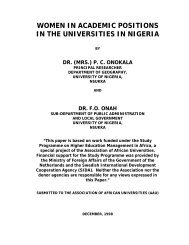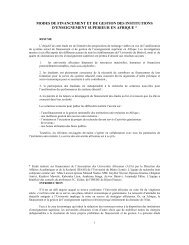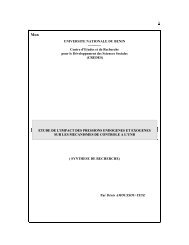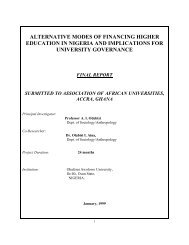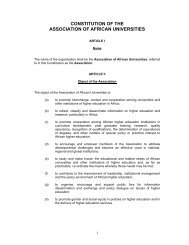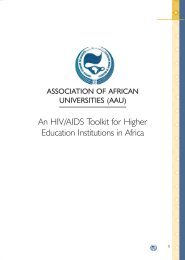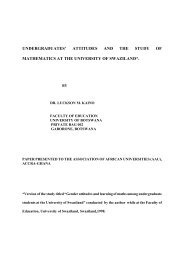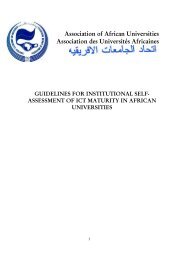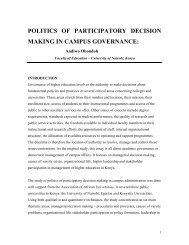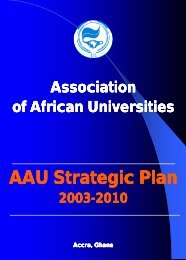governing teacher education colleges in south africa
governing teacher education colleges in south africa
governing teacher education colleges in south africa
You also want an ePaper? Increase the reach of your titles
YUMPU automatically turns print PDFs into web optimized ePapers that Google loves.
27<br />
The council was frequently referred to as a stakeholder forum <strong>in</strong>clud<strong>in</strong>g “all the immediate<br />
stakeholders (students, the work<strong>in</strong>g community at the college, faculty, government, bus<strong>in</strong>ess<br />
and <strong>in</strong>dustry).” 50 Concerns were expressed about the need to expand the present composition<br />
of college councils to make them more representative and legitimate and the need to extend<br />
their powers and functions. Generally the Council determ<strong>in</strong>es college policy whereas the<br />
rector is responsible for the general adm<strong>in</strong>istration and management of the <strong>in</strong>stitution and<br />
for the execution of those policies set forth by the council. As Cleary has correctly po<strong>in</strong>ted<br />
out, the divid<strong>in</strong>g l<strong>in</strong>e between these two prov<strong>in</strong>ces is often unclear. 51 College adm<strong>in</strong>istration<br />
is broadly responsible for adm<strong>in</strong>istration, f<strong>in</strong>ancial control, staff appo<strong>in</strong>tments and<br />
discipl<strong>in</strong>ary issues.<br />
The functions of the council comprise <strong>in</strong>ter alia: (i) def<strong>in</strong><strong>in</strong>g and review<strong>in</strong>g the mission,<br />
goals, objectives and policies of the <strong>in</strong>stitution; (ii) monitor<strong>in</strong>g the <strong>education</strong>al programme;<br />
(iii) decid<strong>in</strong>g about the employment of the rector; (iv) develop<strong>in</strong>g <strong>in</strong>stitutional policy; (v)<br />
ensur<strong>in</strong>g professional management of the college; (vi) manag<strong>in</strong>g f<strong>in</strong>ancial resources and<br />
facilities; and (vii) monitor<strong>in</strong>g and evaluat<strong>in</strong>g <strong>in</strong>stitutional performance. 52 Council members<br />
are <strong>in</strong> a position to see the overall <strong>in</strong>stitutional picture and to take the long view. However,<br />
the balance between the council and the college executive responsibilities and between the<br />
prov<strong>in</strong>cial government and the council have been areas of <strong>in</strong>tense contestation.<br />
Senates comprise essentially of faculty and students and those responsible for academic and<br />
professional issues. Only the two historically white <strong>colleges</strong> have senates. The other two<br />
<strong>colleges</strong> don’t. While the need for establish<strong>in</strong>g senates is widely shared, an important po<strong>in</strong>t to<br />
note is the contention that college senates should not be modelled on the traditional university<br />
model where a clear dist<strong>in</strong>ction is made between academic functions of the senate and the<br />
governance/adm<strong>in</strong>istrative functions of the council. There needs to be a close relationship<br />
between these two dimensions. 53 Hope was placed on senates as the key to lead<strong>in</strong>g <strong>colleges</strong><br />
<strong>in</strong>to becom<strong>in</strong>g genu<strong>in</strong>e tertiary <strong>in</strong>stitutions: “So a senate to me will be part of the process...<br />
especially now that we are talk<strong>in</strong>g of try<strong>in</strong>g to be autonomous or tertiary <strong>in</strong>stitutions, we must<br />
50 Stakeholder is a concept which has become very popular under the new political dispensation <strong>in</strong><br />
South Africa. Stakeholders are def<strong>in</strong>ed as persons or groups with a common <strong>in</strong>terest <strong>in</strong> a particular<br />
action, its consequences, and who are affected by it. All actors <strong>in</strong> an <strong>in</strong>stitutional context are potential or<br />
passive stakeholders. In <strong>education</strong> these <strong>in</strong>clude groups such as parents, students, <strong>education</strong> faculties,<br />
professional organizations and others. All these groups have an <strong>in</strong>terest <strong>in</strong> sett<strong>in</strong>g the <strong>education</strong>al agenda<br />
and shap<strong>in</strong>g the organizations, which are established to participate <strong>in</strong> the process of <strong>education</strong> provision.<br />
Their <strong>in</strong>clusion <strong>in</strong> the decision process is now widely accepted as an important method for <strong>in</strong>creas<strong>in</strong>g<br />
<strong>in</strong>formation for decision mak<strong>in</strong>g and for <strong>in</strong>creas<strong>in</strong>g commitment to decisions once made.<br />
52 Robert E Cleary, "Trustee-President authority relations", <strong>in</strong> Marv<strong>in</strong> W Peterson (ed.), op cit, p.219.<br />
53 Graystone, op cit, p.566.<br />
53 Haroon Mohamed, Interview May 1998.<br />
27



